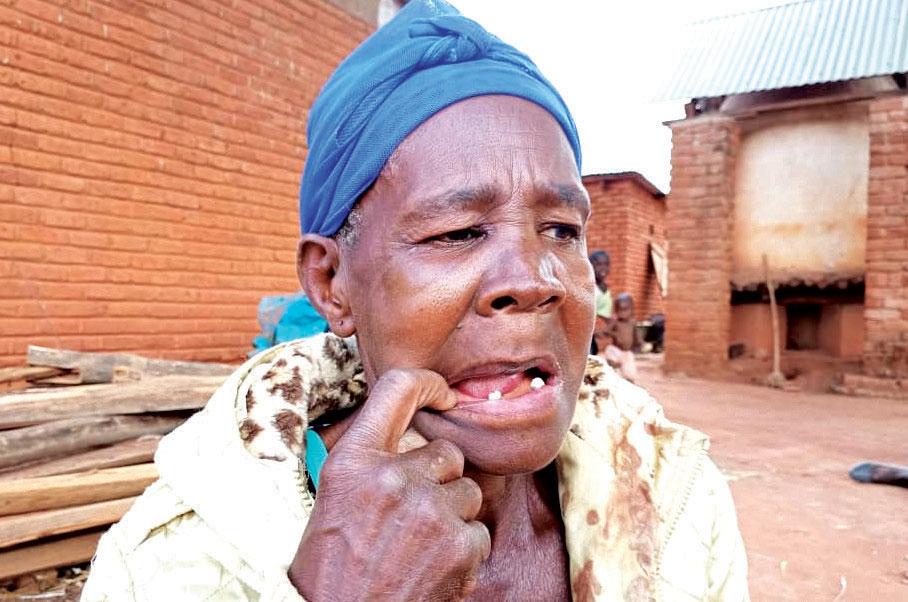Africa-Press – Malawi. The Malawi Police Service has moved quickly to arrest people suspected of attacking 77-year-old Christina Mphande, an elderly woman they accused of practising witchcraft.
On Saturday, people in Mandala Zimba Village, under Senior Chief Kampingo Sibande in Mzimba District, tormented and tortured the elderly woman, with a video of the incident going viral and attracting the anger of Malawians.
Mzimba Police Station spokesperson Peter Botha told The Daily Times that 20 suspects have been arrested in connection with the incident. “In our view, the suspects have committed several crimes, ranging from unlawful wounding, calling a person a witch to causing violence.
“Once we are done with paperwork and investigations, we are going to take them to court to answer the charges,” Botha said.
On Saturday, when community members were attending a burial ceremony, things turned nasty as some people started pointing accusatory fingers at Mphande, alleging that she was the one behind the ‘sudden’ death of her daughter-in-law, who was domiciled in South Africa.
They then forced her to fill the mound of her daughter-in-law’s grave. It was a sordid sight as the woman helplessly attempted to fulfil the task, with the aid of her sister.
Before long, a lunging punch to the head sent her sprawling to the ground and onto the very grave she was forced to fill up. “One of the youths beat me so hard that I lost two of my teeth in the process. I lost control and fell into the grave. I saw darkness and knew that I was gone,” Mphande said.
She added, while shedding tears, that as they made their way to the graveyard, some community members told her in the face that they were contemplating burying her alive.
Mphande, whose clothes were bloody, said it was when they arrived at the graveyard that the worst scenario happened, where she was pushed into the grave.
The news has sent chills down the spine of most people, and has since re-ignited debate surrounding the fate of the Witchcraft Act review, whose draft has been gathering dust and some cobwebs in the hands of the authorities.
Meanwhile, Malawi Network of Older Persons Organisation Executive Director Andrew Kavala has lamented events that unfolded in Mzimba District over the weekend.
He calls for a quick fix of the law, saying Malawi’s Witchcraft Act of 1911 does not recognise the existence of witchcraft and states that it is an offence to accuse anyone of practising witchcraft.
Kavala says, in a statement, that there is a need to review laws, lamenting the government’s delays to finalise work on the draft Act that can help stakeholders address problems such as elderly abuse.
“The draft bill has been on the shelf for three years now, yet the elderly are still facing all sorts of harassment…these are some of the areas which we, as nation, need to look at,” Kavala said.
When contacted, Director of Disability and Elderly in the Ministry of Gender, Community Development and Social Welfare Gideon Kachingwe admitted that there has been a delay in having the draft bill deliberated on but said it was submitted to the Ministry of Justice for scrutiny.
Kachingwe said they presented the draft bill in 2020 and that they are waiting for feedback. “We have a limit [to our work] and that is the reason we are waiting for the Ministry of Justice. We have tried to push, through the minister and many other means, but it has not worked. So, we are just waiting to hear from them,” Kachingwe said.
Gender, Community Development and Social Welfare Minister Patricia Kaliati said in a separate interview that they are working with the police and the District Commissioner’s office in Mzimba to make sure that the victim is safe.
“I cannot say more to avoid compromising the security of the two women,” Kaliati said. Some sections of society have faulted traditional leaders, who they accuse of failing to tame those that accuse others of practising witchcraft.
People’s Federation for National Peace and Development Executive Director Edward Chaka said traditional leaders play a key role in sensitising community members to various issues, hence they must join those who are promoting the rights of the elderly and other people.
Chaka said, if the government can engage community members through chiefs, some of the problems fuelled by people’s beliefs could be addressed. “Apart from engaging traditional leaders on the issue, all Malawians have to join hands to clean the country’s image. Those that attack the elderly are giving the country a bad name,” he said.
Inkosi ya Makhosi M’mbelwa has, on his part, condemned the Mzimba incident, saying this should be the first and last time this has happened in his area. The Mzimba Ngoni king said elderly people deserve protection other than ridicule and torture.
In December 2021, the Special Law Commission on the Review of the Witchcraft Act announced that it had established that the majority of Malawians believe that witchcraft exists, hence the need for the law to acknowledge the same.
However, chairperson for the commission, Justice Robert Chinangwa (retired), said the commission was recommending that, despite people recognising its existence, witchcraft practice should be criminalised.
The commission released its findings at an event that was attended by Minister of Justice and Constitutional Affairs Titus Mvalo. The Witchcraft Act of 1911 assumes that the act does not exist; as such, it is an offence to accuse someone of being a witch or wizard.
The commission found that “there is witchcraft, or at least” a belief in witchcraft that Malawians have been worried about. “The commission concludes that it is not correct to argue that there is no witchcraft in Malawi for the sole reason that the practice is premised upon mere belief.
“Consequently, the commission concludes that the existence of witchcraft should not be regarded as a doubtful, but conclusive,” Chinangwa said.
The retired justice added that most countries that were colonised by Britain assume that witchcraft does not exist, but Uganda and Zimbabwe have now recognised the practice.
The commission also recommended that any person found in possession of an article used in practising witchcraft should be liable to five years imprisonment.
There is another recommendation that cases of witchcraft should be tried from the level of resident magistrate court and above. If a person is convicted, the court shall order confiscation and destruction of any article which was, or might have been used, in committing the offence.
Mvalo said at the time that the findings and recommendations were reflective of Malawians’ belief that witchcraft exists. “In my view, it will bring change that, for once, people will know that if you are arrested on suspicion of [doing or saying something related to] witchcraft, there is a possibility of conviction and imprisonment.
“Hopefully that will scare away people from indulging in this practice and bring law and order,” he said.
The minister said the report would be brought to the attention of ministry officials, and a draft bill looked at by a technical team, before taking it to Parliament.
Currently, Malawi laws do not recognise the existence of witchcraft. It is expected that, once all the processes are followed, the draft legislation will be submitted to Parliament as a government-sponsored bill.
For More News And Analysis About Malawi Follow Africa-Press






